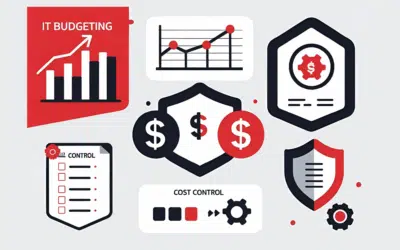Cloud computing stands not only as a significant business tool but also a transformative technology affecting how we work. Far from being another buzzword, it’s a dynamic force reshaping business operations. Let’s dissect cloud computing and its capacity to enhance your business efficiency.
Think of cloud computing as a gigantic, virtual storage box. Unlike conventional methods where data and software get tucked away on your personal computer or a local server, cloud computing shifts everything to the cloud. This cloud pertains to a server network spread out globally, securing your data and applications for access anytime and from any place with an internet connection.
What makes cloud computing a game-changer in business operations? It serves as a doorway to efficiency enhancement. It simplifies collaboration, enabling teams across diverse locations to work together, sharing real-time files and updates. It also provides businesses with an opportunity to fine-tune operations. It allows automation of numerous routine tasks, thus saving time and cutting down errors. Moreover, it bolsters data management and accessibility, offering robust security and fuss-free data recovery.
Boosting Efficiency with Cloud Computing
Cloud computing significantly improves team collaboration. Shared workspaces and project management tools like Microsoft 365, Slack, and Asana streamline the work process by placing everything in one accessible location. This structure allows for real-time updates and adjustments, fostering clear communication and increased productivity within teams.
Moreover, cloud computing enables real-time communication and instant data sharing. Gone are the days of working with outdated documents and dealing with unnecessary revisions. With cloud services, teams work on the most recent version of a document, allowing for fewer errors and time savings. It also simplifies video conferencing and instant messaging, ensuring seamless team communication regardless of geographic location.
Enhancing Operations with SaaS Solutions
Discussing cloud computing necessitates acknowledging the power of Software as a Service, also known as SaaS. Salesforce for Customer Relationship Management (CRM) and QuickBooks for accounting are examples of SaaS applications that have transformed the way businesses operate.
These applications cover a wide range of areas, including project management, customer service, and data analysis. Their appeal lies in their accessibility and flexibility. You don’t need to install anything on your device – simply access them over the internet. Additionally, their subscription-based model allows for easy adjustment based on your needs.
SaaS solutions streamline your operations. Consider a CRM system: it organizes your customer data, tracks interactions, and automates tasks such as sending follow-up emails. This automation reduces your manual workload, freeing up time for strategic tasks. Similarly, accounting software like QuickBooks simplifies bookkeeping and offers insights into your financial health, aiding decision-making. Countless SaaS applications can assist various parts of your operations.
Integrating SaaS solutions into your daily operations replaces tedious, time-consuming tasks with automated, efficient processes. This increases productivity, ensures accuracy, and allows your team to focus on what truly matters – growing your operations.
Enhancing Data Management and Accessibility
Imagine accessing all your data instantly, anytime, anywhere. This is the convenience cloud computing offers. Instead of sifting through countless folders on various computers or servers, cloud storage gathers your data in one central location for easy accessibility.
Cloud computing simplifies data handling by streamlining storage and retrieval. All forms of data, including documents, images, and videos, are neatly organized in the cloud. You can retrieve them in just a few clicks, no matter your location. Moreover, cloud storage handles different file formats and large data volumes without overwhelming your local storage. It’s akin to a vast, virtual file cabinet that never fills up!
Now, think about the possibility of losing vital data to a system crash or a malicious attack – a real nightmare, right? Cloud computing offers peace of mind with enhanced data security and recovery options. It encrypts your data, keeping it safe from unauthorized access. Additionally, it provides an effective backup and recovery system. Thus, even if your local system crashes or falls victim to a cyber attack, your data stays secure in the cloud, ready for restoration whenever necessary.
Understanding the Practicality of IaaS and PaaS
Cloud computing presents various service models designed to enhance efficiency. Infrastructure as a Service, or IaaS, is one such model. With IaaS, you rent hardware resources such as servers and storage from a cloud provider. It eliminates the need for purchasing, installing, or maintaining physical servers. Instead, you adjust these resources according to your immediate requirements, optimizing costs and resource management.
Platform as a Service, or PaaS, is another model. PaaS offers a complete platform for developing, testing, and deploying applications. It provides access to programming languages, tools, and databases, relieving you from managing the infrastructure. This opportunity allows you to concentrate more on coding rather than setup, configuration, and management, accelerating your development process and product launch.
In short, IaaS and PaaS provide the flexibility to adapt your resources and capabilities in response to your evolving needs. These models allow you to stay agile and responsive, matching the pace of the dynamic environment.
Effective Cloud Integration in Businesses: A Study
Cloud technology offers vast benefits to small and medium-sized businesses. Consider a retail company that transitioned to a cloud-based inventory management system. The system provided real-time updates on stock levels and sales, eliminating manual tracking. This switch eradicated errors from manual entry and enhanced time-efficiency, boosting overall productivity.
A mid-sized marketing agency exemplifies another success story. The agency adopted cloud-based project management tools to streamline communication. Centralizing communication and tasks enabled team members to view updates instantly, improving collaboration and work pace.
Cloud computing also brings substantial benefits to large enterprises. A multinational corporation implemented a cloud-based Enterprise Resource Planning (ERP) system, unifying their global operations. This real-time information access across all branches enhanced operational efficiency and facilitated more informed decision-making.
Another global enterprise leveraged cloud-based data analytics tools to process large volumes of data. The insights derived from the data steered strategic decisions, maintaining the company’s competitiveness. This example underlines how the cloud can equip large enterprises with the resources they need for high-efficiency operation.
Closing Thoughts
The choice is yours. Adopt cloud computing to reap its rewards or stay behind in the competitive race. Success favors those who stay informed and ahead of the game. Connect with us right now. We can join forces to infuse your operations with cloud solutions. This shift has the potential to simplify processes and boost efficiency.
Whether your business is just getting started or already established, the power and utility of the cloud will provide massive benefits. To get started on your journey to the cloud, contact Axxys Technologies. Our team of engineers can recommend, integrate, and manage the right cloud tools for your business. Contact Axxys today.








